Diesel Mechanic
Entry Level Qualification
10
Career Fields
Mechanic & Technician
For Specially Abled






Career Entrance Exam
About Career
1. As a Diesel Mechanic after your Diploma, you will mainly be repairing, servicing and overhauling any type of mechanical or automotive diesel-based devices and equipment like generators, pumps, engines, etc., for efficient performance. You will be examining them to locate defects, using various tools and instruments.
2. You will be dismantling (opening) or partly dismantling them to remove damaged or worn out (overused) parts and replace or repair them. You will be installing assembled or repaired machine parts in position by connecting pulleys or wheels.
3. You will start or tune them up and observe performance by noting different meter readings such as temperature, oil pressure, fuel level, etc. and set it to specified standards for optimum performance. You will be checking, adjusting and lubricating them periodically and perform other maintenance functions to keep them in good working order.
4. Diesel Mechanics generally work in repair workshops. As a Diesel Mechanic, you also have to follow certain safety guidelines for work. You will generally have to work for about 8 hours per day that is around 40 hours’ work per week. However, your work days may vary and include holidays too.
PARTICULARS | DESCRIPTION |
Name | Diesel Mechanic |
Purpose | Repair and Replace Damaged or Worn Parts |
Career Field | Mechanic & Technician |
Required Entrance Exam | No Entrance Exam |
Average Salary | 1,50,000 - 3,00,000 Per Year |
Companies For You | Automobile, Oil and Gas, Iron & Steel & Many More |
Who is Eligible | Class 10th Pass |
Key Roles and Responsibilities
As a Diesel Mechanic, you will be engaged with one or more of the following roles and responsibilities: -
1. You will inspect, repair and replace damaged or worn parts of any type of mechanical or automotive diesel-based products and equipment like generators, pumps, engines, clutches, transmissions etc.
2. You will read and understand operating blueprints, manuals, and technical drawings.
3. You will raise heavy parts or equipment, trucks, buses using hydraulic jacks or hoists to inspect them.
4. You will use handheld tools like screwdrivers, pliers, pressure gauges, or precision tools (precision tools are used for making or measuring something in a very exact way), as well as power tools, like wrenches, lathes, welding equipment, or jacks.
5. You will find faults or malfunctions for determining what kind of repairs are required and perform repair using diagnostic equipment such as computerized test equipment and calibration devices.
6. You will weld or solder (join together) broken parts using gas or electric welders and soldering tools.
7. You will perform routine maintenance jobs like checking batteries, changing oil, and lubricating machinery and equipment.
8. You will run tests on the finished/repaired mechanical products and equipment for ensuring proper performance and compliance with given specifications.
Career Entry Pathway
Class 10 all subjects as per scheme of studies - training for ‘Diesel Mechanic’ at an ITI or similar institute.
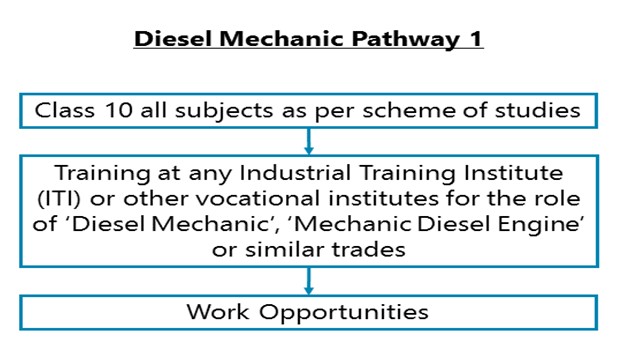
After Class 10, you can go for training at any Industrial Training Institute (ITI), National Skill Training Institute (NSTI), Regional Vocational Training Institute (RVTI), National Vocational Training Institute (NVTI), Industrial Training Center (ITC) or other vocational institutes for the role of ‘Diesel Mechanic’, ‘Mechanic Diesel Engine’ or similar trades. You will sit for All India Trade Test (AITT) to get a National Trade Certificate (NTC) after this course. This exam is held twice a year in the months of February and July.
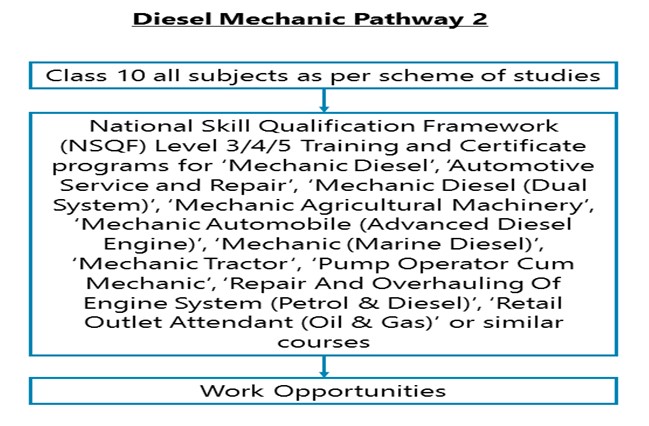
After Class 10, you can go for National Skill Qualification Framework (NSQF) Level 3/4/5 Training and Certificate programs for ‘Mechanic Diesel’, ‘Automotive Service and Repair’, ‘Mechanic Diesel (Dual System)’, ‘Mechanic Agricultural Machinery’, ‘Mechanic Automobile (Advanced Diesel Engine)’, ‘Mechanic (Marine Diesel)’, ‘Mechanic Tractor‘, ‘Pump Operator Cum Mechanic’, ‘Repair And Overhauling Of Engine System (Petrol & Diesel)’, ‘Retail Outlet Attendant (Oil & Gas)’ or similar courses. The total number of training hours range between 300-4120 and NSQF levels vary accordingly.
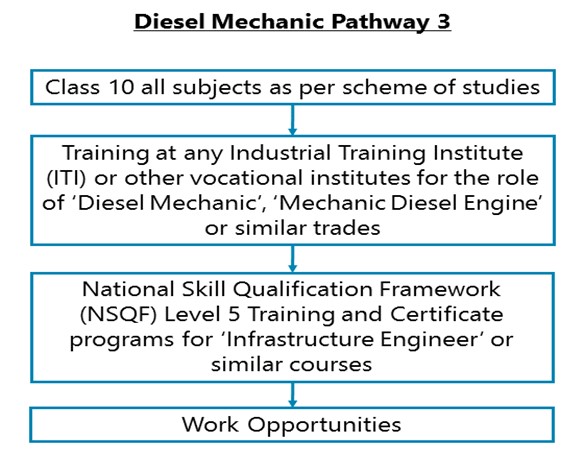
After Class 10, you can go for training at any Industrial Training Institute (ITI), National Skill Training Institute (NSTI), Regional Vocational Training Institute (RVTI), National Vocational Training Institute (NVTI), Industrial Training Center (ITC) or other vocational institutes for the role of ‘Diesel Mechanic’, ‘Mechanic Diesel Engine’ or similar trades. You will sit for All India Trade Test (AITT) to get a National Trade Certificate (NTC) after this course. This exam is held twice a year in the months of February and July. Then you can go for National Skill Qualification Framework (NSQF) Level 5 Training and Certificate programs for ‘Infrastructure Engineer’ or similar courses. The total number of training hours range is 300.
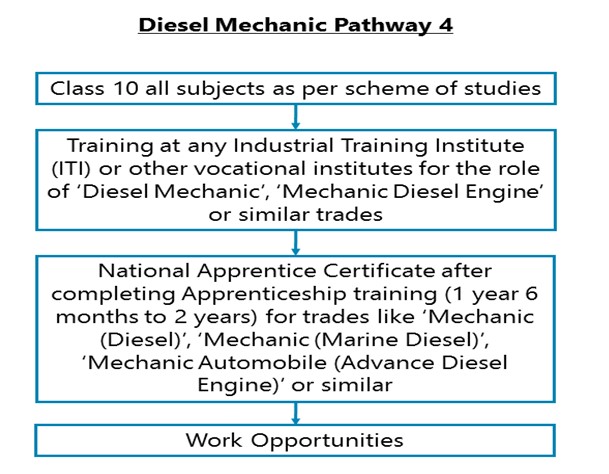
After Class 10, you can go for training at any Industrial Training Institute (ITI), National Skill Training Institute (NSTI), Regional Vocational Training Institute (RVTI), National Vocational Training Institute (NVTI), Industrial Training Center (ITC) or other vocational institutes for the role of ‘Diesel Mechanic’, ‘Mechanic Diesel Engine’ or similar trades. You will sit for All India Trade Test (AITT) to get a National Trade Certificate (NTC) after this course. This exam is held twice a year in the months of February and July. Then you can obtain a National Apprentice Certificate after completing Apprenticeship training (1 year 6 months to 2 years) for trades like ‘Mechanic (Diesel)’, ‘Mechanic (Marine Diesel)’, ‘Mechanic Automobile (Advance Diesel Engine)’ or similar. You can join apprenticeship directly after Class 10 without ITI training. In this case, the duration of your training will be 2 – 3 years.
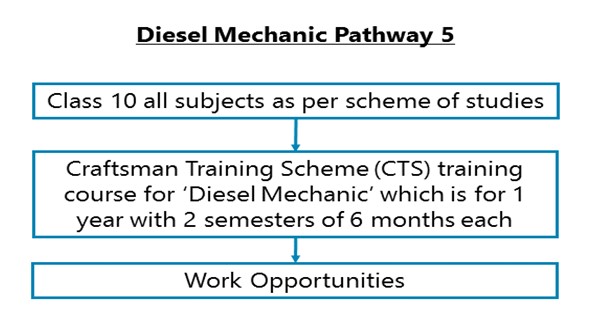
After Class 10, you can go for Craftsman Training Scheme (CTS) training course for ‘Diesel Mechanic’ which is for 1 year with 2 semesters of 6 months each.
Required Qualification & Competencies
After completing Class 10, you can go for:
1. ITI training courses.
2. NSQF training courses.
Various private, as well as public educational institutions, also offer these or related courses:
1. Mechanic Diesel Engine
2. Mechanic (Marine Diesel)
3. Mechanic Automobile (Advance Diesel Engine)
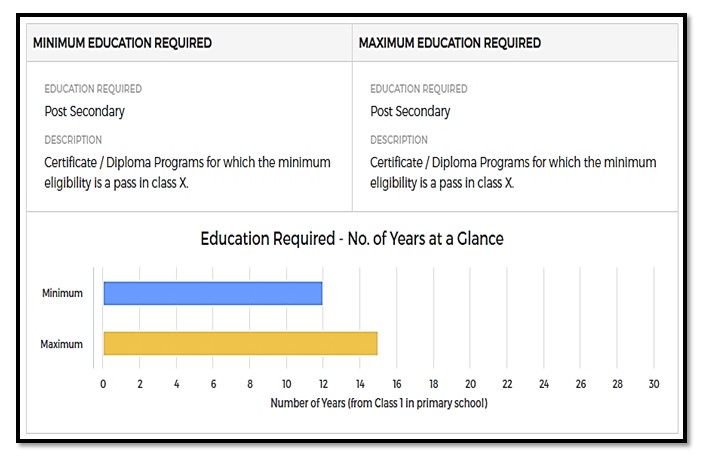
Competencies Required
1. You should have interests for Realistic Occupations. Realistic occupations involve more practical and hands-on activities than paperwork or office work. Realistic occupations often involve physical activities for getting things done using various tools and equipment.
2. You should have interests for Conventional Occupations. Conventional occupations involve repetitive and routine tasks as well as fixed processes or procedures for getting things done. These occupations involve working more with data, systems, and procedures and less with ideas or creativity.
3. You should have interests for Investigative Occupations. Investigative occupations involve working with ideas and quite a lot of thinking, often abstract or conceptual thinking. These involve learning about facts and figures; involve the use of data analysis, assessment of situations, decision making and problem-solving.
4. You should have knowledge of Mechanical Engineering & Technology - Mechanical Engineering & Technologies which include design, development, testing, manufacturing, installation, operations, repair and maintenance of different machinery, devices, equipment and tools.
5. You should have knowledge of Engineering and Technology - various applications of one or more branches of Engineering Science & Technology to manufacture and produce various goods or construct or erect various structures. This includes knowledge about design, development, prototype testing, manufacturing, construction, installation, repair and maintenance.
6. You should have knowledge of Technical and Engineering Design - Knowledge of various techniques, methods, specifications and tools for designing, developing, testing, and evaluating integrated systems for managing industrial production processes, manufacturing plants, structures, and systems. This includes studying blueprints, drawing, and models.
7. You should have knowledge of Transportation - Knowledge of principles and methods for moving people or goods by air, rail, sea, river, or road, or otherwise, including the relative costs and benefits.
8. You should have knowledge of Public Safety and Security - Knowledge of relevant equipment, policies, procedures, and strategies to maintain law and order situations, providing state or national security for protecting geographical territories, marine territories and sky from potential enemy attacks and protecting people and properties.
9. You should have Machine Repair and Maintenance Skills - Skills in performing repair and maintenance of different machines, equipment, and devices.
10. You should have Operating Skills - operating various machines, equipment, devices and systems.
11. You should have Operations and Process Analysis Skills - analysis of operations and processes such as industrial manufacturing, chemical processing, etc. so as to device better and more efficient operational processes and systems.
12. You should have complex Process and Operation Controlling Skills - controlling processes and operations of various machines, equipment, devices and systems using different types of electrical and electronic control instruments and systems.
13. You should have Judgment and Decision Making Skills - Skills in considering the pros and cons of various decision alternatives; considering costs and benefits; taking appropriate and suitable decisions.
14. You should have Troubleshooting Skills - determining causes of operating errors and deciding what to do about it.
15. You should have Equipment Sourcing Skills - sourcing the right equipment for different purposes such as industrial manufacturing, civil, mechanical and electrical construction, etc.
16. You should have Supervising Skills - Supervising and monitoring the performance of others, businesses, and different projects.
17. You should have Mathematical Reasoning Ability - to choose the right mathematical methods or formulas to solve a problem.
18. You are always or mostly care about your actions and behaviour.
19. You are practical always or in most situations.
20. You are always or mostly disciplined in your action and behaviour.
21. You are always or mostly organized in your day-to-day life and activities.
Career - Job Opportunities & Profiles
You may get job roles like:
1. Diesel Engine Mechanic
2. Assistant Diesel Mechanic
3. Technician 'A' - Mechanic (Diesel)
4. Motor Mechanic
5. Heavy Equipment Diesel Mechanic
6. Assembler, Stationary Diesel Engine
7. Heavy Duty Diesel Mechanics
8. Diesel Vehicle Mechanic
9. Diesel Mechanic – Apprentice
10. Junior Diesel Mechanic
11. Diesel Mechanic-Trainee
These are some of the industries that will require your services as a Diesel Mechanic:
1. Construction / Engineering / Cement / Metals
2. Automobile / Auto Anciliary / Auto Components
3. Industrial Products / Heavy Machinery
4. Oil and Gas / Hydrocarbons / Energy / Power / Infrastructure
5. Iron and Steel
Career Growth
You can certainly grow through job roles like Senior Mechanic, Senior Heavy Duty Diesel Mechanic, Project Manager, Senior Motor Mechanic, Production Line Supervisor, Diesel Workshop Manager, etc.
Salary Offered
1. At the beginning of your career as a junior mechanic, you will be earning about Rs. 10,000-12,000 per month.
2. After 2-3 years of experience, you will be getting about Rs. 12,000-17,000 per month.
3. When you acquire about 7-8 years of experience, you can earn about Rs. 17,000-25,000 or even more per month.
4. After 12-15 years of experience, you can earn about Rs. 30,000-35,000 or more per month.
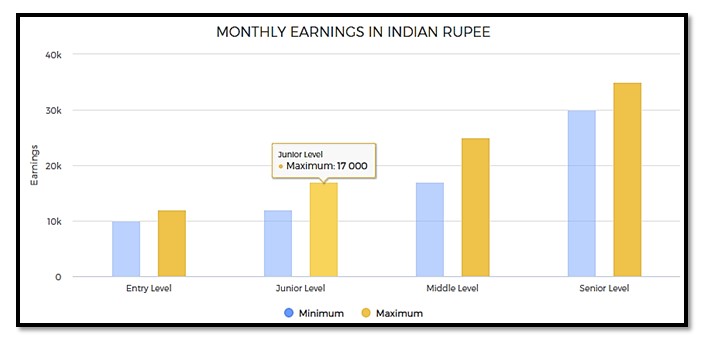
Monthly Earnings In Indian Rupee

1. Entry level: 0 - 2 years of work experience
2. Junior Level: From 1 to 12 years of work experience
3. Mid-Level: From 5 to 20+ years of work experience
4. Senior Level: From 10 to 25+ years of work experience (there could be exceptions in some high-end technical, financial, engineering, creative, management, sports, and other careers; also in the near future, people will reach these levels much faster in many careers and in some careers, these levels will have no meaning as those careers will be completely tech skill driven such as even now, there is almost no level in a Cyber Security Expert’s job)
Work Activities
1. Inspecting equipment, systems, structures, and materials - Inspecting equipment, systems, structures, and materials to ascertain quality, performance, defects, causes of errors, etc.
2. Operating machines, equipment, devices, systems and processes - Using various methods and techniques to operate machines, equipment, devices, systems and processes in industrial and other settings.
3. Handling and moving objects and materials - Using hands or otherwise use physical strength to handle and move objects and materials; manoeuvre, install, lift, place, manipulate, etc.
4. Installing, repairing and maintaining equipment, devices and products - Installing, servicing, repairing, and maintaining equipment, devices, and products for usages in homes, workplaces and industrial settings.
5. Monitoring processes, systems and performance - Observing and recording information on various criteria to monitor mechanical, electronics, electrical and other processes and systems; monitoring progress of projects and tasks.
6. Performing physical activities - Performing physical activities that require use of your arms and legs and moving your whole body, such as climbing, lifting, balancing, walking, stooping, and handling of materials.
7. Identifying objects, actions, and events - Identifying various characteristics of objects; observing and understanding actions and events; understanding changes in actions and events.
8. Organising, planning and prioritising tasks - Planning and organising tasks in order to achieve work goals; prioritising tasks to achieve goals and making the best use of the time available.
9. Communicating with co-workers and others - Communicating with people in writing, verbally or otherwise inside your workplace and various other people who have professional relationships with your place of work including vendors, government officials, etc. or with people at large.
10. Working in a team - Working in a team of people; developing a team; maintaining professional relationships among team members.
Future Prospects
India is one of the most prominent auto exporters, and its exports is expected to grow in the coming years. In April-November, it had grown about 20.78 percent and it is expected to grow at a CAGR (Compound Annual Growth Rate) of 3.05 percent. Plus, there are many initiatives that are being taken by the Indian Government and the other major automobile industry which can make India a leader in the two-wheeler and four wheeler market in the world. This shows that there will be a demand of diesel mechanics in the future.
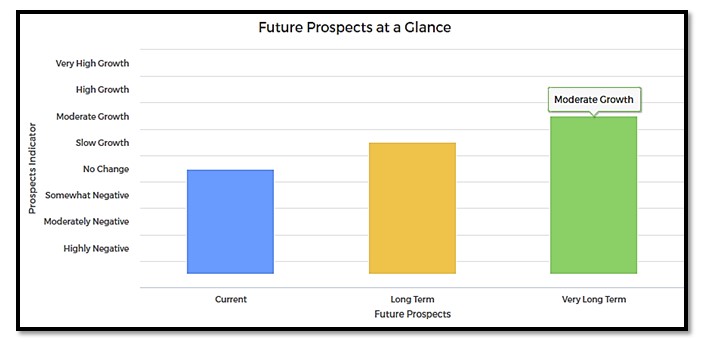
Future Prospects At A Glance



